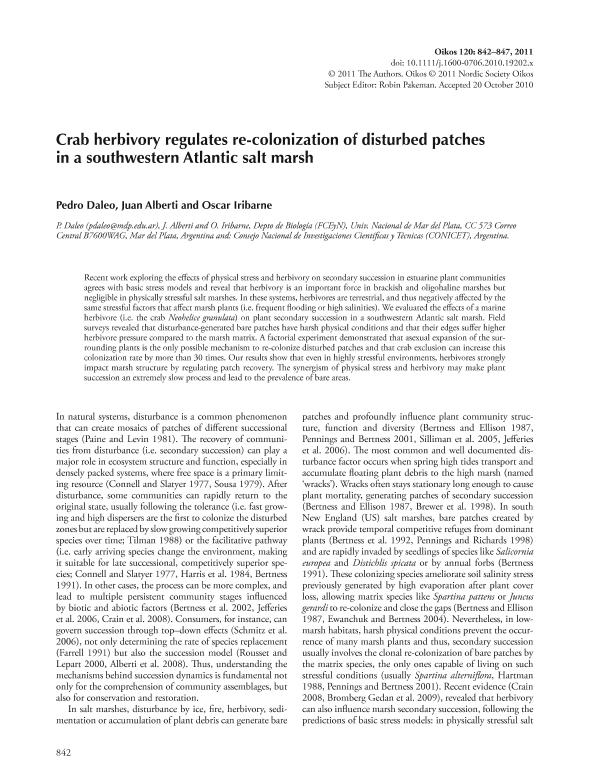Artículo
Crab herbivory regulates re-colonization of disturbed patches in a southwestern Atlantic salt marsh
Fecha de publicación:
06/2011
Editorial:
Wiley Blackwell Publishing, Inc
Revista:
Oikos
ISSN:
0030-1299
Idioma:
Inglés
Tipo de recurso:
Artículo publicado
Clasificación temática:
Resumen
Recent work exploring the effects of physical stress and herbivory on secondary succession in estuarine plant communities agrees with basic stress models and reveal that herbivory is an important force in brackish and oligohaline marshes but negligible in physically stressful salt marshes. In these systems, herbivores are terrestrial, and thus negatively affected by the same stressful factors that affect marsh plants (i.e. frequent flooding or high salinities). We evaluated the effects of a marine herbivore (i.e. the crab Neohelice granulata) on plant secondary succession in a southwestern Atlantic salt marsh. Field surveys revealed that disturbance-generated bare patches have harsh physical conditions and that their edges suffer higher herbivore pressure compared to the marsh matrix. A factorial experiment demonstrated that asexual expansion of the surrounding plants is the only possible mechanism to re-colonize disturbed patches and that crab exclusion can increase this colonization rate by more than 30 times. Our results show that even in highly stressful environments, herbivores strongly impact marsh structure by regulating patch recovery. The synergism of physical stress and herbivory may make plant succession an extremely slow process and lead to the prevalence of bare areas.
Palabras clave:
HERBIVORY
,
SECONDARY SUCCESSION
,
DISTURBED PATCHES
Archivos asociados
Licencia
Identificadores
Colecciones
Articulos(IIMYC)
Articulos de INSTITUTO DE INVESTIGACIONES MARINAS Y COSTERAS
Articulos de INSTITUTO DE INVESTIGACIONES MARINAS Y COSTERAS
Citación
Daleo, Pedro; Alberti, Juan; Iribarne, Oscar Osvaldo; Crab herbivory regulates re-colonization of disturbed patches in a southwestern Atlantic salt marsh; Wiley Blackwell Publishing, Inc; Oikos; 120; 6; 6-2011; 842-847
Compartir
Altmétricas




